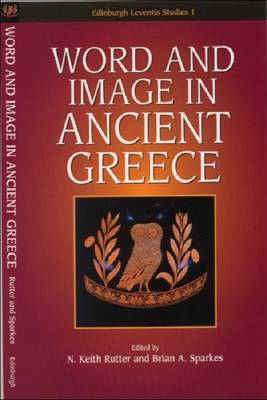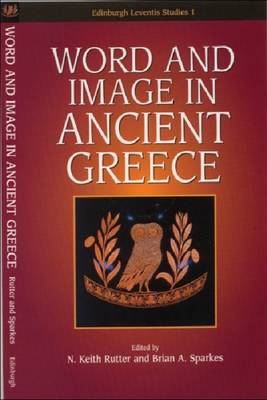
- Retrait gratuit dans votre magasin Club
- 7.000.000 titres dans notre catalogue
- Payer en toute sécurité
- Toujours un magasin près de chez vous
- Retrait gratuit dans votre magasin Club
- 7.000.0000 titres dans notre catalogue
- Payer en toute sécurité
- Toujours un magasin près de chez vous
Description
In ancient Greek society communication was largely oral and visual. The epic poets sang and recited the legends that served the Greeks as their historical past; lyric and elegiac poets sang songs of love and death and celebrated military and sporting success to the accompaniment of the lyre and pipes; the art of rhetoric was a vital ingredient in speeches in the assembly and the law courts; in tragedies and comedies actors spoke to audiences of thousands. Of equal importance to the Greeks were the images with which they were always surrounded - civic and religious monuments, statuary, architectural decoration, and the scenes of myth, fantasy and everyday life with which their vases and vessels were painted and decorated.This volume of new work by leading scholars explores the ways in which these two central aspects of Greek culture interact, and throws new light on their many and related functions. The subjects include the creation of the Greek myths during the early centuries of the first millennium BC when the technique of writing had been lost; the significance of words and images on painted pottery; the relationship between drama on stage and the illustration of the same stories on pottery; and the ways in which stories portrayed in monumental sculpture on temples were understood by the people who came to look at them. Classical Greece produced the beginnings of the tradition of philosophical reflection on the nature and value of images, notably in the work of Plato and Aristotle: the concept of mimesis, concerned with questions both of representation and expression, is directly addressed by several of the authors, and forms an underlying theme of the volume as a whole.The authors are drawn from the historical, archaeological, literary, philosophical and art historical fields of classical study. The book, which contains 50 illustrations, makes a coherent and important contribution to a subject of great current interest to classicists of all disciplines.
Spécifications
Parties prenantes
- Auteur(s) :
- Editeur:
Contenu
- Nombre de pages :
- 320
- Langue:
- Anglais
- Collection :
Caractéristiques
- EAN:
- 9780748614059
- Date de parution :
- 01-11-00
- Format:
- Livre broché
- Format numérique:
- Trade paperback (VS)
- Dimensions :
- 156 mm x 233 mm
- Poids :
- 471 g

Les avis
Nous publions uniquement les avis qui respectent les conditions requises. Consultez nos conditions pour les avis.






